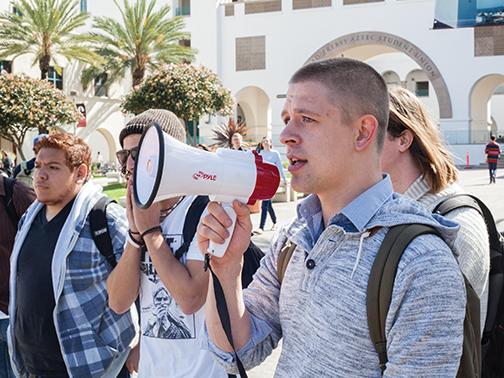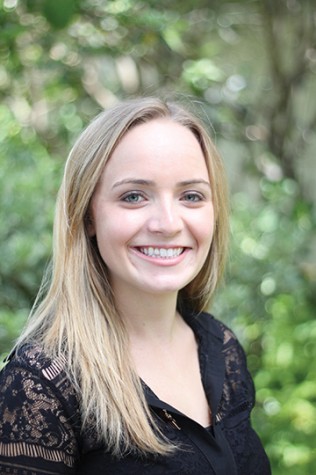The Student Success Fee is happening.
Most of you probably know this by now. The topic has raged through campus during the past few weeks. Associated Students and the administration urged students to attend informational forums, members of this newspaper covered it extensively, and finally, once people realized this was actually going on, student protesters stormed through campus staging sit-ins, picketing and even silently protesting with tape-covered mouths at the Conrad Prebys Aztec Student Union dedication ceremony.
Well, that all essentially did nothing, but that’s not the problem. [quote]The real issue with this whole debacle is the inadequate communication from San Diego State’s administration to accurately inform students of the status of the decision-making process and its choice to ignore those who spoke out.[/quote]
When the informational forums were still being held, The Aztec released an editorial calling on the administration to do all it could to better inform students of what was at stake and what they could do. We felt that both the administration, and our efforts as the student media, failed to reach enough students to encourage them to attend forums, and that the results would therefore not be representative of the entire student body.
[quote]Well, just like the protesters, our editorial also did nothing.[/quote] Even though the administration did step-up its promotional game, the total amount of Aztecs who attended and provided feedback at a Student Success Fee forum was still sadly a feeble 1,015 students, or 3.5 percent of the total student body, the vast majority of who voted in favor of a fee increase.
But I don’t blame this poor turnout fully on the administration. Getting students to attend something referred to as an “informational forum” is a tough sell. At the time, administrators were doing what they could to get students informed, a motive that apparently ended once the results came out in their favor.
On Feb. 28, the Campus Fee Advisory Committee unanimously approved a $200 fee increase. That same day, a group of student protesters marched into Hirshman’s office demanding to have their voices heard. Hirshman refused to meet with them.
On March 3, Hirshman offered to meet with a small delegation of protesters on the following Thursday morning. That same day, he approved CFAC’s recommendation and sent his own approval of the fee to the California State University Chancellor, disregarding his future plans to meet with the concerned students. In an interview with The Aztec, Hirshman explained that at that point, communication with the protesters and his staff had lead him to believe that their demands were extreme, and their input would no longer be productive. However, this information was never passed on to the protesters, who continued to meet throughout the next few days.
[quote]On March 14, 11 days after he had officially recommended the fee increase to the chancellor, Hirshman finally announced his recommendation to the student body through a blog post. Throughout this entire time period, Hirshman did not meet with the protesters once.[/quote]
To be fair, these students would have had a better opportunity to speak out if they had attended forums and their tactics would most likely have been more effective there. But as I’ve mentioned, it took some time to get the word out, and clearly everyone wasn’t reached. Hirshman and the administration’s decision to ignore the protesters’ legitimate, although belated, concerns just because they missed a deadline tells the student body that it’s warranted to blatantly disregard their opinions. What’s more is they were strung along for days and placated by the administration to falsely believe they could actually still make a difference.
When the blog was finally published, it went relatively unnoticed. There was no email, no Blackboard announcement, nothing. To put that into context, all students received an email informing of the campus closure this past Friday because of the NCAA tournament. Apparently, the announcement that money will be taken out of every students’ pocket didn’t deserve that same courtesy. Hirshman’s justification for this was that fees are not traditionally announced and that he wanted to use the opportunity to provide a more meaningful explanation than an email would allow for.
“We wanted to find a way that could engage the campus community in a thoughtful discussion, not an inflammatory discussion, or a ‘Hey this is the way it is, that’s that,’” he said in an interview with The Aztec. “It’s more of a ‘Let’s think about these issues.’”
I agree with that sentiment entirely, but I somehow doubt that this was the honest intention. If he was actually interested in a “thoughtful discussion,” then why were the protesters ignored? Why was the decision kept quiet from the vast majority of students for 11 days? What was going on where the administration felt warranted to hold onto this information, despite the huge public interest the protesters had stirred up by this point? I understand that both feedback from the informational forums and the CFAC recommended a fee and so Hirshman took it. He listened to those students and did what he believed was best for the university. The decision to pass the fee is not the point of this story. What I am concerned about is the lack of communication and promotion the entire ordeal received. While the administration did make a few small announcements about the progression of the fee, this feeble attempt at transparency was as weak as the efforts to spread the word about the forums to begin with.
[quote]Regardless of the outcome of the fee, the bottom line is students deserve to be in the know. [/quote]If a president is supposed to be the leader of an entire university, he or she is responsible for addressing student interests, not covertly making announcements and hoping everyone will diligently search for the answers they seek. This entire situation has been handled in a way that leaves students wondering about the motives and actions of their administration, not because they necessarily question the integrity, but because they simply don’t know the answers.
To clear confusion and prove honest intentions, the only thing to do is increase transparency at this university, starting at the top. From there, students can decide whatever they want.
Photo by Wesley Beights, staff photographer.









